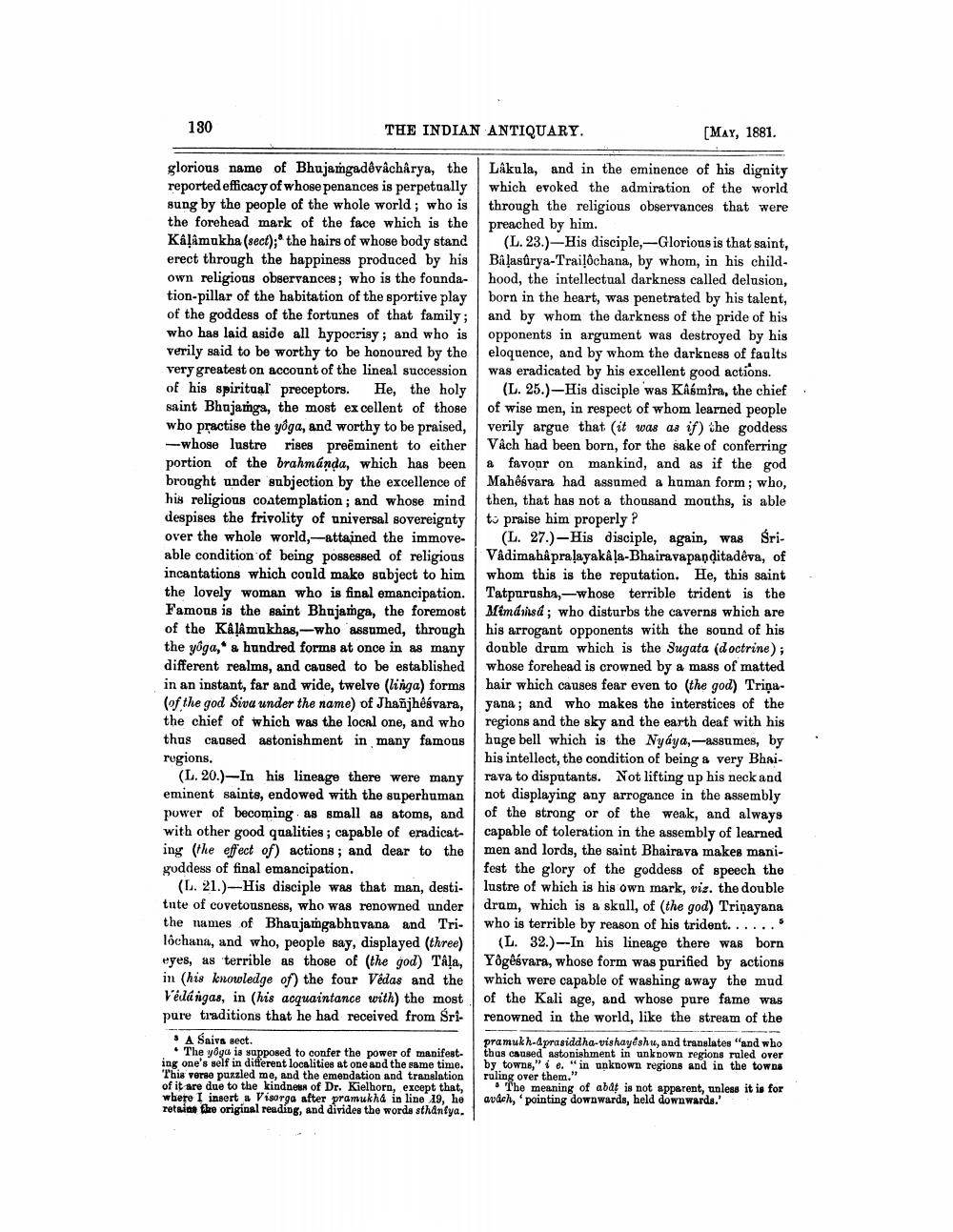________________
130
THE INDIAN ANTIQUARY.
glorious name of Bhujamgadêvâchârya, the reported efficacy of whose penances is perpetually sung by the people of the whole world; who is the forehead mark of the face which is the Kâlâmukha (sect); the hairs of whose body stand erect through the happiness produced by his own religious observances; who is the foundation-pillar of the habitation of the sportive play of the goddess of the fortunes of that family; who has laid aside all hypocrisy; and who is verily said to be worthy to be honoured by the very greatest on account of the lineal succession of his spiritual preceptors. He, the holy saint Bhujamga, the most excellent of those who practise the yoga, and worthy to be praised, -whose lustre rises preeminent to either portion of the brahmánda, which has been brought under subjection by the excellence of his religious coatemplation; and whose mind despises the frivolity of universal sovereignty over the whole world, attained the immoveable condition of being possessed of religious incantations which could make subject to him the lovely woman who is final emancipation. Famous is the saint Bhujamga, the foremost of the Kâlâmukhas,-who assumed, through the yoga, a hundred forms at once in as many different realms, and caused to be established in an instant, far and wide, twelve (linga) forms (of the god Siva under the name) of Jhanjhêśvara, the chief of which was the local one, and who thus caused astonishment in many famous regions.
(L. 20.)-In his lineage there were many eminent saints, endowed with the superhuman power of becoming as small as atoms, and with other good qualities; capable of eradicating (the effect of) actions; and dear to the goddess of final emancipation.
(L. 21.) His disciple was that man, destitute of covetousness, who was renowned under the names of Bhaujamgabhuvana and Trilochana, and who, people say, displayed (three) eyes, as terrible as those of (the god) Tâla, in (his knowledge of) the four Védas and the Védangas, in (his acquaintance with) the most pure traditions that he had received from Śri
3A Saiva sect.
The yoga is supposed to confer the power of manifesting one's self in different localities at one and the same time. This verse puzzled me, and the emendation and translation of it are due to the kindness of Dr. Kielhorn, except that, where I insert a Visorga after pramukhá in line 19, he retains the original reading, and divides the words sthantya.
[MAY, 1881. Lâkula, and in the eminence of his dignity which evoked the admiration of the world through the religious observances that were preached by him.
(L. 23.)-His disciple,-Glorious is that saint, Bâlasurya-Trailôchana, by whom, in his childhood, the intellectual darkness called delusion, born in the heart, was penetrated by his talent, and by whom the darkness of the pride of his opponents in argument was destroyed by his eloquence, and by whom the darkness of faults was eradicated by his excellent good actions.
(L. 25.)-His disciple was Kâśmira, the chief of wise men, in respect of whom learned people verily argue that (it was as if) the goddess Vâch had been born, for the sake of conferring a favour on mankind, and as if the god Mahêévara had assumed a human form; who, then, that has not a thousand mouths, is able to praise him properly?
(L. 27.)-His disciple, again, was ŚriVâdimahâpralayakâla-Bhairavapaṇḍitadeva, of whom this is the reputation. He, this saint Tatpurusha,-whose terrible trident is the Mimámsá; who disturbs the caverns which are his arrogant opponents with the sound of his double drum which is the Sugata (doctrine); whose forehead is crowned by a mass of matted hair which causes fear even to (the god) Trinayana; and who makes the interstices of the regions and the sky and the earth deaf with his huge bell which is the Nyaya,-assumes, by his intellect, the condition of being a very Bhairava to disputants. Not lifting up his neck and not displaying any arrogance in the assembly of the strong or of the weak, and always capable of toleration in the assembly of learned men and lords, the saint Bhairava makes manifest the glory of the goddess of speech the lustre of which is his own mark, viz. the double dram, which is a skull, of (the god) Trinayana who is terrible by reason of his trident.......
(L. 32.)-In his lineage there was born Yôgêśvara, whose form was purified by actions which were capable of washing away the mud of the Kali age, and whose pure fame was renowned in the world, like the stream of the
5
pramukh-aprasiddha-vishayeshu, and translates "and who thus caused astonishment in unknown regions ruled over by towns," i e. "in unknown regions and in the towns ruling over them."
The meaning of abat is not apparent, unless it is for avách, pointing downwards, held downwards.'




